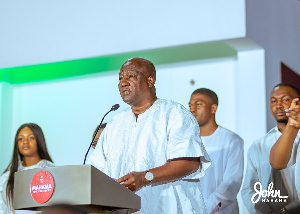Throughout the COVID-19 pandemic, Ford Motor Company has dedicated considerable resources to assist global communities and humanitarian organisations involved in helping the most vulnerable members of our society.
As part of its COVID-19 relief programme, Ford Motor Company Fund (Ford Fund) – the philanthropic arm of Ford – has extended its community support by donating GH¢117,000 to the Maltiti Foundation – a non-governmental organization dedicated to facilitating the promotion of quality livelihood for women living in deprived communities in Ghana.
Achraf El Boustani, Managing Director for Ford Africa – Direct Markets, said, “This crisis has shown us how social responsibility is important to support communities, especially those who have been hit hard by the pandemic.
This initiative reaffirms Ford's commitment to supporting and assisting fragile communities to help work through this pandemic together, and we’re proud that we’re able to help where it’s most needed.”
“We are delighted to partner with Maltiti Foundation in supporting the activities of women in rural communities. This project designed to train women in different fields to enable them to embark on an income-generating activity and aiming to make them independent in order to improve their economic conditions, has inspired us to the highest point.
Our support for this program underscores, once again, Ford's commitment to gender equality and non-discrimination and demonstrates our commitment to helping to advance women in society.”, continued El Boustani.
The objective of the “Women in Agric project” is to train 200 women and girls in the East Gonja traditional area on good agricultural practices. The project is targeted at economically empowering and equipping girls and young women with relevant skills in agriculture that can be monetized to help them deal with the economic constraints of living in this pandemic and post COVID-19.
In the coming weeks, Maltiti Foundation will work to engage all stakeholders including the head of the traditional area of Kpembe, the offices of the municipal assembly as well as with agricultural agents of the target communities, on the one hand to recruit the agents who will give the agricultural trainings and secure the lands that will be used as trial sites for practical training.
And on the other hand, organize open discussion forums with women from target communities to identify beneficiaries.
Ewura Adams Karim, Co-founder and Executive Director of Maltiti Foundation, said “Founded on the belief that when progressive and genuine attention is dedicated to supporting women, it can awaken and release human potential in profound and unique ways, the Maltiti Foundation seeks to promote quality health care and nutrition, sustainable and dignifying economic opportunities, entrepreneurship, informal education, sexual reproductive health among women in deprived communities.
“Women in Agric” is an economic empowerment program geared towards reducing the rate of rural urban migration among young girls in rural Ghana by providing them with economic opportunities in agriculture.”
“We started this initiative in 2018 after realizing that a greater number of the women in rural Ghana migrate to the cities in search of economic opportunities. The pilot of the project benefitted 30 women in 2018. And, today, thanks to Ford and the Ford Fund support, we will be able to benefit 200 women from this project.”
At the end of the project, the girls and women will be equipped with both theoretical and practical skills in Agriculture, financial literacy, marketing and life skills in order to build a skilled workforce of women empowered by the dignity of agricultural work.
They will also be given personal development training, personal and menstrual hygiene guidelines, sexual and reproductive health information and education geared towards reducing the rate of teenage pregnancies, STIs (Sexually Transmitted Infection Symptoms) and maternal mortalities.
Further, the initiative will create an ecosystem to mentor beneficiaries to start up and run their own small-scale agro-enterprises.



Click to view details



Press Releases of Tuesday, 27 April 2021
Source: Ford Motor Company

















